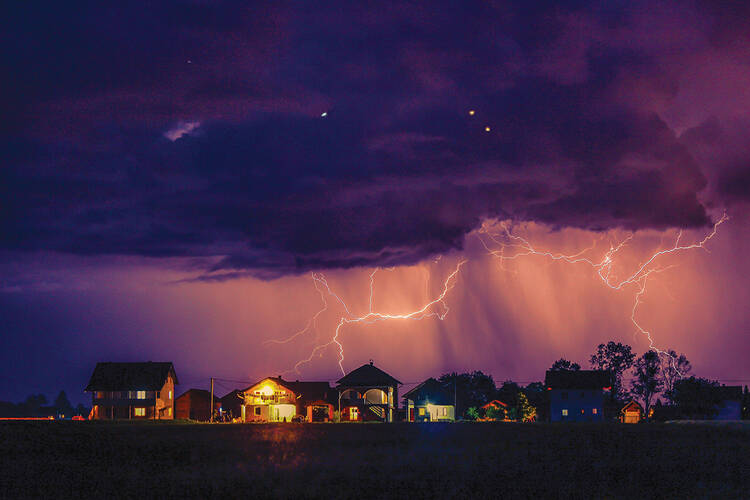Trees are shattered, thunder roars, lightning flames, but what is taking place remains unclear. At first it is difficult to recognize the subject of Psalm 29. We have to sit with it in order to recognize what it is describing.
Perhaps you have been in the mountains when a storm has struck. The power and ferocity of it can be terrifying and awesome. The sound of the thunder alone can leave an indelible impression. Such storms truly do, as the psalm states, cause animals to give premature birth (v. 9). Maybe you have seen the aftermath of such a violent storm. Mighty trees are felled. Fires rage. The landscape is transformed. But it is not just the landscape that is transformed; so too are the people who have experienced it.
The author of this psalm was very familiar with such a storm. We can imagine the author making his way on the mountain when suddenly a storm broke and he was alone, exposed to the elements. The experience is intense. After a time the psalmist seeks to put that moment into words. Aside from what psalms might teach us, they are also compelling as pieces of literature. The poetic description is wonderfully evocative here. While the psalm is worthy of our attention as literature alone, there is always something more than mere evocation of nature in a psalm.
After the storm passes the psalmist reflects on what has taken place. As they recall the experience they identify the sense of awe they felt at the display of power in the natural world. And then their thinking turns to the power and majesty of the G-d who created the mountain itself, the trees on it, the lightning and the thunder: G-d the creator, the one who is infinitely more powerful than this display of the most overwhelming forces of the natural world. The sound of the thunder becomes a dim echo of the voice of G-d. A mountain storm becomes a metaphor for the G-d who is both outside of nature and its source. The encounter with a mountain storm gives the psalmist—and us—a chance to confront the awesome power of G-d.
The mountain storm reminds the psalmist of the history of the people of Israel. There was another moment when the earth shook and a mountain resonated with thunder and blazed with lightning. At that moment, the whole assembled household of Israel recognized the voice of G-d in nature. The psalmist’s thoughts are carried back to “the wilderness of Kadesh” (v. 8) when the people as a whole had its profound encounter with G-d and received the Ten Commandments at Sinai. The thundering voice, the commanding presence: these are the very images evoked when we read Exodus 19. We stand at Sinai every moment. We are always at the doorway of the presence of G-d, always in a place to hear G-d’s voice and called on to respond to it. The mountain storm in the life of the psalmist, the mountain storms we have experienced and the mountain aflame in the Sinai moment are connected. We do not live in the present alone. In the life of the spirit, past and present flow together. We live in all those moments at once. We are part of the great spiritual mountain peaks no less than in the moment we call “our own.”
To underscore this point, the focus shifts from the psalmist’s storm experience and from Sinai to our own lives. Part of the power of the psalms is that they are, in the end, always about us. The G-d of the psalms is not a G-d of the distant past or of the great historical moments. The G-d of the psalms is the G-d whom we meet in our own lives.
We end with yet another evocation of G-d. For the G-d who is at the core of psalms is no mere force of nature, nor mere power alone. Throughout the psalms, we are reminded that G-d is a caring presence. G-d looks after us and seeks our welfare. The conclusion of this graphic evocation of G-d’s power ends on a very different note. G-d is invoked in terms of our relationship. The last verse offers consolation and hope. After we have been thrown into the turmoil and terror of the mountain storm, the psalmist assures us that G-d will give us the strength to withstand such terrifying moments: not only the storms that break out in the mountains, but all the storms that can erupt in our lives. The storms will not prevail against us. G-d gives us strength to endure and to overcome.
We do more than prevail. The psalmist holds out to us G-d’s most precious gift. Whatever the challenges, whatever the obstacles and travails, in the end, the psalmist assures us, G-d will bless us with shalom. While we are accustomed to translating the word shalom as “peace,” it conveys an even more resonant meaning than that. Shalom evokes a sense of wholeness, well-being, completeness. After experiencing all the shaking and the shattering, all the breaking of trees and the stripping bare of forests, all the disruption of the landscape, by the end of the psalm we find ourselves emerging intact.
We experience storms. No one can escape them. But we also experience our own resilience, our reservoirs of endurance. The G-d who unleashes such overwhelming destruction is the very same G-d who can give us strength to endure it; the G-d who, in the end, will bless us with shalom: wholeness, well being, peace around us and completeness within ourselves.








